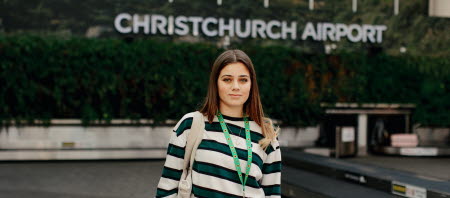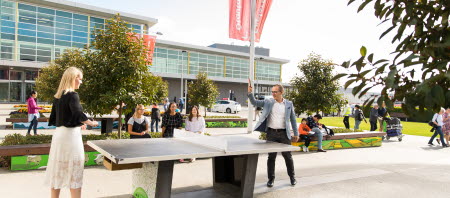Preparing for your journey
For a stress-free journey, it’s important to prepare for your flight in advance. We’ve covered everything you need to know below to help make your journey as smooth as possible.
-
International travel
Find out what to expect at the airport when you travel internationally.
-
Check-in
Make sure you arrive at the airport early. Give yourself plenty of time to get here, especially if you’re crossing town at peak travel times. Once you get to the airport you’ll need time to check-in and, if your flight departs from Gates 16 - 34, to go through security screening and immigration.
For a smooth check-in process, please ensure you meet the latest travel requirements before you arrive at the airport. You’ll need to bring the required documentation with you. Here are some quick links to help you prepare:
For more specific information about check-in times or travel requirements, please contact your airline directly.
-
Security screening
Our top priority is for you to have a safe journey. If you’re departing from Gates 16 - 34 you must go through a security screening process. To help you get through security without being delayed, please:
- Remove steel-cap footwear or those with metal adornments. If you wear any footwear that covers the ankles, including those without metal adornments, you may be asked to remove them and place them into an X-ray tray. If you wear this type of footwear during screening you may trigger the metal detection alarm and be subject to additional security measures. You can put your footwear on once you have been through security
- Remove outer clothing such as jackets and place into an X-ray tray
- Empty pockets of all items, particularly anything that contains metal and place into an X-ray tray.
For domestic flights departing from Gates 16 - 22:
- New screening technology has been introduced to make your journey safer. This includes the introduction of body scanners and enhanced screening of hand luggage. Find out more about body scanners here
- Drinks must be in a sealed, leak proof container. Drinks that are not sealed can no longer be taken through screening.
For international flights you should also:
- Latest technology means you don't need to take electronics (laptops, tablets, iPads), liquids, powders or gels out of your bag
- Pack camera film in your checked luggage
- Store small personal items, including hats, scarves, headphones, keys, cell phones and loose coins in your bag
- Present your prescription and non-prescription medicine in a separate plastic bag, and if required, supporting information from a registered medical practitioner
- Present any food or supplements for a medical diet (and supporting information from a registered medical practitioner) in a separate plastic bag.
For more information, please visit the Aviation Security Service website.
-
Luggage
The number of bags and weight of each item you can take on your flight is set by your airline. If you're not sure what your luggage limit is, make sure to check with your airline before you arrive at the airport.
Check what you can take in your carry-on or hand luggage before you fly. Certain items are restricted or prohibited, including weapons, dangerous goods, powders, liquids, aerosols, gels and others. Find out what you can and can’t take on board on the Aviation Security Service website.
Need help with luggage storage or wrapping? Find out more here.
-
Powders, liquids, aerosols and gels
If you’re travelling on an international flight you can only take a restricted amount of liquids, aerosols, gel-like substances and powder in your carry-on luggage.
The restrictions:
- Apply only to carry-on luggage for international flights
- Do not apply to domestic flights (drinks must be in a sealed, leak proof container. Drinks that are not sealed can no longer be taken through screening)
- Do not apply to checked luggage for international flights
- Volume limits apply to a single passenger.
All restrictions are strictly applied. Aviation Security officers have the final say if there is any doubt about what items can be carried on board.
Liquids, aerosols and gel restrictions
- All liquids, aerosols, or gels must be packaged in individual containers of 100ml or less. This restriction applies to the size of the container and not its content. For example, if a container is larger than 100ml and the content is less than 100ml, the item will still be prohibited.
- The total number of containers that are 100ml or less must not exceed one volumetric litre.
Powder restrictions
The total volume of inorganic powders must not exceed 350ml or 350g.
If you have more than 350ml/350g of inorganic powder it must go in your checked luggage.
Some items are exempt from the 350ml/350g limit. This includes items such as baby powder or formula for those travelling with a young child, cremated human remains, therapeutic products and medicines that are exempt from these restrictions. Any exempted powder will still be inspected.
Powders do not need to be put in a resealable plastic bag.
What is powder?
Powder is defined as fine dry particles produced by the grinding, crushing, or disintegration of a solid substance (for example, flour, sugar, ground coffee, spices, powdered milk, baby formula or cosmetics). Powders may also be presented in clumpy, grain, or compressed material forms.
Inorganic powder means a powder or a similar granular substance that contains no living matter and has not been made from living matter. Examples include things like:
- Salt scrub
- Bath bombs
- Sand
- Some talcum powders
- Some powdered deodorant
- Certain foot powders
- Some cosmetics (both compressed and loose powders)
- Some powdered detergent and cleaning products.
Inorganic powder can also be found in unexpected items, like:
- The fill/stuffing of some toys and souvenirs
- Body powders (e.g. talcum powder, foot powders and powdered deodorants)
- Laundry powders and other powdered cleansers
- Dietary supplements (e.g. minerals or vitamins).
For more information, visit the Aviation Security Service website.
-
Batteries and power banks
No loose or spare batteries will be allowed in passengers' checked luggage. This includes batteries in their original retail packaging. There will also be a limit of 20 loose or spare batteries of any type allowed in carry-on luggage, unless an airline has approved the carriage of more batteries. This is due to changes to the International Air Transport Association (IATA) Dangerous Goods Regulations.
Portable power banks are not permitted in checked luggage. Please place them in your carry-on luggage.
To find out more, visit the Aviation Security Service website.
-
Medical items
Visit the Aviation Security Service website for information to support passengers travelling with medical items.
-
Special assistance
We're committed to providing assistance that is readily accessible to all members of the community. Find out more about special assistance available at the airport including support for travellers with hidden disabilities.
When planning your journey, please remember to let your airline know about any special assistance you may require.
-
Passports and Visas
New Zealanders travelling overseas may need a visa to enter certain countries. For some countries, your passport will need to be valid for at least six months. Always check your destination country's entry requirements before your travel, and give yourself enough time to renew your passport and/or apply for a visa at the relevant embassy or consulate.
If you have question about visa requirements, including transit visas, for visiting New Zealand please visit the Immigration New Zealand website.
-
Duty free allowances
You can pre-order your duty free items from Aelia Duty Free and collect them when you depart or arrive back at Christchurch Airport.
If you're leaving New Zealand with duty free purchases, make sure you meet the Customs allowances for each of your travel destinations. Check with Aelia Duty Free if you’re unsure about duty free allowances.
-
Airline lounges
We have a range of comfortable airline lounges here at Christchurch Airport. Find out more about what’s available here.
-
Sleeping facilities/accommodation
There are no sleeping facilities at the airport terminal.
The terminal currently opens at 3am each day and closes after the final scheduled flight. If you have a query about the terminal's operating hours, please call +64 3 353 7777.
There’s a number of hotels and motels near the airport. Your closest hotel is Novotel, located right outside International Arrivals. Sudima Airport Hotel is located five minutes’ walk from the terminal and LyLo offers affordable accommodation just ten minutes’ walk from the terminal.
-
Travel advice
For advice on travel warnings, visas and consular services, please visit the SafeTravel website.




 Loading flights...
Loading flights...
